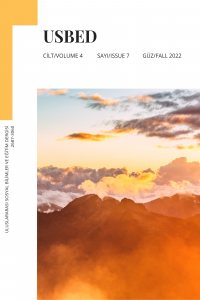Demographic Differences in the Perception of Constraints on Participation to Recreational Activities: Results from a Study Made the University in Turkey
Öz
Amaç: Bu çalışmada neredeyse tüm ülkelerin önem verdiği konulardan biri olan rekreasyon konusunda daha fazla bilgi edinebilmek amacıyla üniversite öğrencilerinin rekreasyonel aktivitelere katılımını etkileyen ve engelleyen bazı faktörlerin incelenmesi amaçlanmıştır.
Yöntem: Kesitsel tipte olan bu epidemiyolojik araştırmanın evrenini, toplam 471 öğrenci oluşturmaktadır. Belirlenen evrenin tamamına ulaşılması hedeflendiği araştırmada 407 öğrenciye ulaşılmıştır (%86,4).
Bulgular: Öğrencilerin rekreasyonel etkinliklere katılımlarında engel oluşturan ilk üç unsur sırasıyla “Tesis” 3.04(±0.7), “Zaman” 8.46(±2.02) ve “Bilgi Eksikliği” 8.64 (±2.46) faktörleridir. Öğrencilerin ölçeğin alt boyutlarından aldıkları puan ortalamaları incelendiğinde, tüm alt boyutlarda kadın katılımcıların puan ortalamalarının, arkadaş eksikliği alt boyutunda “17-20” yaş grubunun, birey psikolojisi alt boyutunda Tıbbi Dokümantasyon ve Sekreterlik programının ve “İlgi Eksikliği” alt boyutunda ise geçmiş yaşantısında aktif olarak spor yapmayan katılımcıların puan ortalamalarının daha yüksek olduğu saptanmıştır.
Sonuç: Çalışmada yer alan kadınların rekreasyonel etkinliklere katılmalarının önünde birçok engel olduğu görülmektedir. Bu durumun, toplumsal cinsiyetin göstergesi olabileceğini düşündürmektedir. Üniversitede kız öğrencilerin rekreasyonel aktivitelere katılımını arttırıcı faaliyetler düzenlenebilir.
Anahtar Kelimeler
boş zaman engelleri rekreasyonel aktiviteler toplumsal cinsiyet üniversite öğrencisi.
Destekleyen Kurum
Yok
Proje Numarası
Yok
Teşekkür
Kırşehir Ahi Evran Üniversitesi Sağlık Hizmetleri Meslek Yükseokulu öğrencilerine veri toplama sürecinde katkılarından dolayı teşekkür ederiz.
Kaynakça
- Selvaratnam, V., et al. (2021). "How Constraints to Campus Recreation Participation Differ Based on Activity Type, Gender, and Citizenship." Recreational Sports Journal 45(1): 61-68.
Demographic Differences in the Perception of Constraints on Participation to Recreational Activities: Results from a Study Made the University in Turkey
Öz
Aim: In this study, we aimed to study certain factors that prevent university students from participating in recreational activities that affect the same in order to obtain more information on recreation, which is one of the issues that almost all countries place importance on.
Methods: The population of this study, which is cross-sectional type of epidemiology study comprised 471 students. We contacted 407 students who were targeted to contact all components of the determined population (86.4%).
Results: We may list top three factors that constitute an impediment for participation of students to recreational events as “Facilities” 3.04(±0.7), “Time” 8.46(±2.02) and “Lack of Information” 8.64 (±2.46) respectively. As we reviewed average points obtained by students from sub-dimensions of the scale, we determined that, in all of the sub-dimensions, average points of female participants are higher, that average points of the age group of “17-20” is higher in the lack of friend sub-dimension, that average points of the Medical Documentation and Sekretaryship program are higher in the psychology of individual sub-dimension, that average points of participants, who did not do sports actively in the past, are higher in the “Lack of Interest” sub-dimension.
Conclusion: We observed that there are several constraints that prevent women, who participated to the study, from participating to recreational activities. This issue suggests that such a situation may be an indicator of gender. Activities can be organized to increase the participation of female students in recreational activities at the university.
Anahtar Kelimeler
leisure constraints recreational activities gender university students.
Proje Numarası
Yok
Kaynakça
- Selvaratnam, V., et al. (2021). "How Constraints to Campus Recreation Participation Differ Based on Activity Type, Gender, and Citizenship." Recreational Sports Journal 45(1): 61-68.
Ayrıntılar
| Birincil Dil | İngilizce |
|---|---|
| Bölüm | Araştırma Makaleleri |
| Yazarlar | |
| Proje Numarası | Yok |
| Yayımlanma Tarihi | 1 Ekim 2022 |
| Gönderilme Tarihi | 14 Nisan 2022 |
| Kabul Tarihi | 4 Haziran 2022 |
| Yayımlandığı Sayı | Yıl 2022 Cilt: 4 Sayı: 7 |


